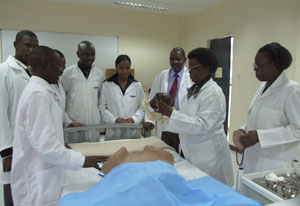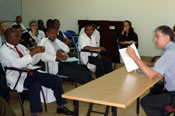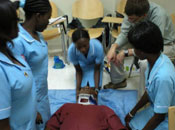HHS partners with PEPFAR to transform African medical education with $130 million investment
September/October 2010 | Volume 9, Issue 5

Photo courtesy of Dr. James Kiarie
The
Medical Education Partnership Initiative (MEPI) will
provide $130 million to expand and enhance health
worker training in sub-Saharan Africa. One grant will
support expansion of medical education activities in
Kenya, such as skills lab instruction shown here at the
University of Nairobi.
The U.S. Department of Health and Human Services is partnering with the U.S. President’s Emergency Plan for AIDS Relief (PEPFAR) to invest as much as $130 million over five years to transform African medical education and dramatically increase the number of health care workers.
Through the
Medical Education Partnership Initiative (MEPI), grants have been awarded directly to African institutions in a dozen countries, working in partnership with U.S. medical schools and universities. The initiative will form a network including about 30 regional partners, country health and education ministries, and more than 20 U.S. collaborators. (Please see the
Directory of Awards and Collaborating Partners for the Medical Education Partnership Initiative.)
Several components of the National Institutes of Health joined PEPFAR in funding the initiative, which is being administered by Fogarty International Center of the NIH and the HIV/AIDS Bureau of the Health Resources and Services Administration (HRSA).
The program is designed to support PEPFAR’s goals to train and retain 140,000 new health care workers and improve the capacity of partner countries to deliver primary health care.
“We must dramatically transform African medical education to increase the number of qualified care providers available and develop the scientific expertise needed for research and innovation,” said Ambassador Eric Goosby, U.S. Global AIDS Coordinator at the Department of State. “By engaging country health and education ministries, MEPI will strengthen national plans to improve medical instruction and bolster the overall health care delivery systems. As we transition PEPFAR-supported HIV efforts from an emergency response to a more sustainable effort, we need to develop the expertise necessary for evidence-based decision making on the local level. This expertise will empower countries to lead health programs and fulfill their responsibility for the health of their people.”

Photo courtesy of Duke Global
Health Institute
Dr. John Bartlett of Duke
University teaches a class at
Kilimanjaro Christian Medical
Centre in Tanzania,
demonstrating the long- term
partnership between U.S.-
based and African partners.

Photo courtesy of Peter Donkor
Doctors in Ghana train together,
where the MEPI award will support
the Ghana Emergency Medicine
Collaborative Training Program.
Eleven programmatic awards, largely funded by PEPFAR, will expand and enhance medical education and research training in the field of HIV/AIDS. Eight smaller non-HIV/AIDS awards, funded by the NIH Director’s Common Fund, with additional support from several NIH institutes, will encourage the development of expertise in topics such as maternal and child health, cardiovascular diseases, cancer, mental health, surgery and emergency medicine. Over a five-year period, MEPI intends to provide up to $10 million for each programmatic award, up to $2.5 million for each linked project and up to $1.25 million for each pilot grant.
“Non-communicable diseases, such as maternal-child health issues, cardiovascular disease, cancer, and mental illness, represent the fastest growing causes of morbidity and mortality in sub-Saharan Africa,” said NIH Director Dr. Francis S. Collins. “We at NIH are delighted to join hands with our colleagues in PEPFAR to help build research and clinical capacity in these important areas of human health.”
A coordinating center will link the African sites and their U.S. partners, leverage shared resources and provide technical expertise. A Web-based platform will allow all partners to share data and outcomes. The platform will facilitate evaluation and provide a gateway to maximize the initiative’s global impact. MEPI will enable participating institutions to strengthen their information technology infrastructure, support distance education and data sharing, and encourage the establishment of clinical registries to inform research and health care decision making on national levels. The coordinating center will also form an African leadership network to guide and advocate for the initiative.
“HRSA’s decades of experience working in HIV/AIDS through the Ryan White HIV/AIDS Program have highlighted the critical need for enhanced medical education and training to provide quality care to people affected by HIV/AIDS in rural and underserved communities. We are proud to collaborate with PEPFAR and NIH to advance medical education in Africa through this initiative, as well as continue supporting the on-going care and treatment and health system strengthening activities,” said Dr. Mary K. Wakefield, HRSA administrator.
NIH funding is being provided by the Common Fund, Office of AIDS Research, Office of Research on Women’s Health, National Heart, Lung and Blood Institute, National Human Genome Research Institute, National Institute of Mental Health, National Institute of Neurological Disorders and Stroke, and National Institute of Nursing Research.
More Information
To view Adobe PDF files,
download current, free accessible plug-ins from Adobe's website.